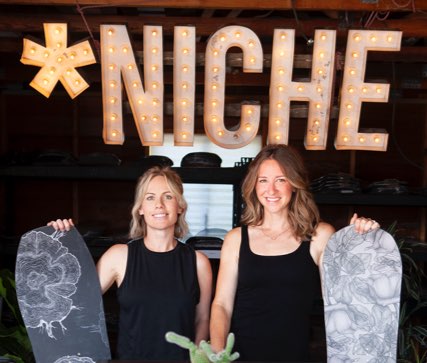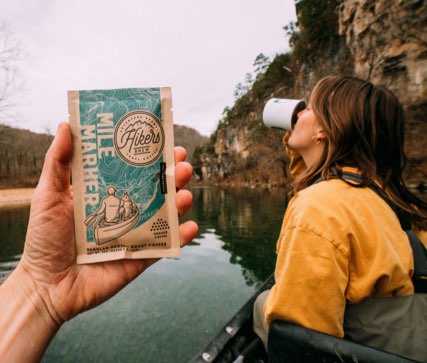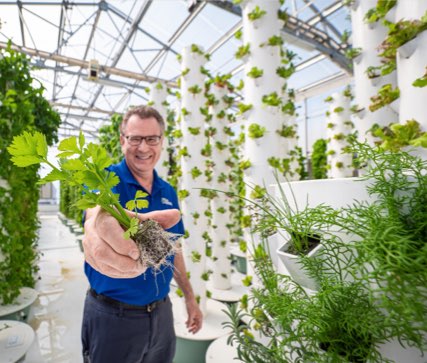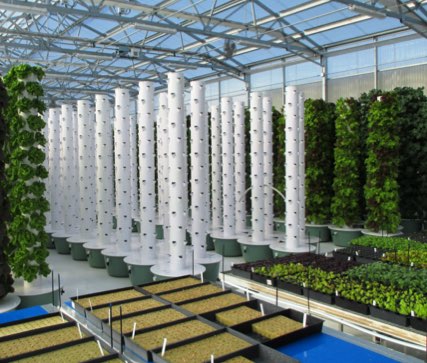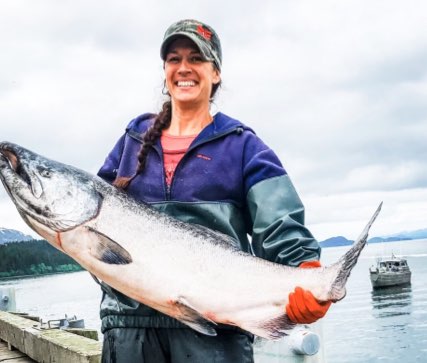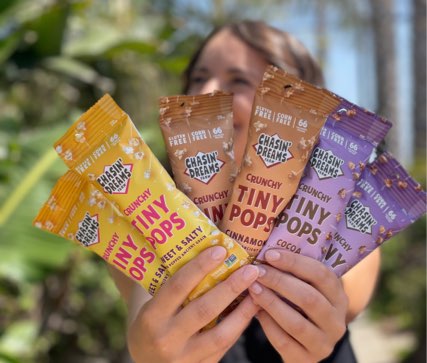Small businesses with
a big sustainability mission
With the Earth’s changing climate comes a necessary shift toward sustainable products, systems, and mentalities. But while it’s a fight that we all need to join, for those businesses that lack training or education around it, it can still feel like they’re too small to have a big enough impact. That’s why we started a conversation with some of the winners of the 2022 FedEx® Small Business Grant program to learn more about how they’re using their power for good, and how we can all do the same.
Find your niche
In 2009, passionate environmentalists and avid snowboarders Kirsten Kolter and Ana Van Pelt set out to create snowboards that would enhance performance, as well as have a limited impact on the environment. And that they did. Grand prize winner Niche Snowboards is a zero-waste and environmentally conscious snowboard company.
Although Kirsten and Ana have always been interested in sustainability, it hasn’t always been easy. “Ten years ago, people didn’t really make the connection. They didn’t understand how eco-friendly snowboards would have an impact or be important,” explains Kirsten.
At times they felt like they were the only ones who cared that the sport they loved was helping destroy the environment it needed to thrive. From toxic supply chains to harmful resins, traditional snowboard manufacturing can be harmful to the environment. According to Kirsten, “We wanted to find a solution.”
So, they tested several prototypes on their home snowboard press. “Some things worked, some things were catastrophic failures,” Ana says. Luckily, they were able to create a formula from a blend of alternative materials for their boards that was light, durable, functional, and fully recyclable—it was a win-win.
But their sustainability mission doesn't end with manufacturing the snowboards. From packaging to manufacturing, Kirsten and Ana have also implemented a zero-waste process. Their Recyclamine® technology takes end-of-life snowboards, recycles them, and gives them new life. When it comes to implementing more sustainable practices into your manufacturing process, Kirsten and Ana believe the small things should be celebrated—whether it’s simple switches in packaging, construction materials, or offsetting your carbon footprint. “Small acts when multiplied by millions of people can change the world,” Ana agrees.
Their challenge has been figuring out easy drop-in solutions and substitutes for harmful materials without a point of reference. “It’s challenging because you have to envision something totally new, and then convince everyone else that it’s worth investing in,” says Ana. “We don’t have all the answers yet, but we know how it should look, so we’re taking little steps and connecting different people to see how we can all work together.”
“Ten years ago, people didn’t really make the connection. They didn’t understand how eco-friendly snowboards would have an impact or be important.”
It’s a climb, but the view is great
Coffee lovers Zach Pecha and Addy Serum first fell in love with the outdoors, and then with each other. They quickly realized that many outdoor enthusiasts don’t have easy access to quality coffee and that fresh-brew feeling we all know and love. “We created Hikers Brew because we saw a need for a sustainable coffee option for outdoor adventures consumers,'' Zach explains.
For Zach and Addy, seeing the amount of waste on their hiking trails sparked the realization that they needed to promote sustainability within the outdoor and food packaging industry. “It always felt like the right thing to do,” Zach says.
Zach and Addy agree that “As a small business, you need to be thinking about sustainability. It’s just the future.” From carbon-neutral shipping, recycling their packaging materials, and partnering with 1% For The Planet and One Tree Planted organizations, Zach and Addy strive to keep their business as sustainable as possible. In fact, creating relationships is one thing Zach and Addy credit their success to. Partnering with Climate Neutral is just one way they stay inspired and create new sustainability goals for their business—the outdoor industry is full of people doing what they can to better the environment. According to Zach and Addy, “It’s about networking and seeing what other companies are doing ... don't be afraid to reach out to anybody. What’s the worst that could happen?”
Growing upward, moving forward
The farther food travels, the further its negative impact reaches. A significant amount of carbon dioxide is generated throughout its production, packaging, transportation, and storage, so reducing food mileage can have a huge impact on the environment. That’s why this year’s winners of the Sustainability Distinction Award, Troy and Lisa Albright, founded the first-ever aeroponic food farm in the Southwest U.S. Today, True Garden specializes in aeroponic systems and seedlings to help people grow their own food wherever they are. “If I could get everybody in my community to grow their own food, we could impact the environment and the water resources tremendously,” explains Troy.
Aeroponic systems can even create positive change across the globe. Troy says, “One of the biggest issues in the world is that we keep shipping food to people without showing them how to do it themselves, so they become reliant on large-scale producers and end up starving when something like a pandemic happens.”
True Garden’s aeroponic towers are empowering both urban growers and consumers to make a change. “You can grow a lot of food with a two-square-foot tower,” Troy stresses. “And who doesn’t have a two-square-foot corner?”
True Garden is also home to solar-powered greenhouses, which help produce clean greens all year round while using 95% less water and 90% less land than traditional farming. “This is a no-brainer. We should all be doing this,” Troy says.
During his time as a pharmacist, Troy came to realize that many of our staple foods are to blame for gut issues. So, when he discovered how to create pesticide-free produce, he was aware of the long-term impact this would have on people’s health. Troy says, “Just think of the reduction in chemicals and everything that you’re not getting exposed to.”
This means that growing your own food not only has a positive impact on the environment, but it can improve your health too. Instead of relying on pharmaceutical drugs to improve our health, Troy believes that by growing our own food, food can become our medicine.
Troy also has big plans for the True Garden app. He hopes it will encourage a loyal customer base with rewards, free products, free services, and free education. “We want to help people who don’t know anything about gardening to figure it out,” Troy says. “We’re really trying to get people to grow food any way they can, whether they buy a tower from us or not.”
Reflecting on his ever-evolving educator role, Troy makes it clear that self-sufficiency is at the core of True Garden. “Can you imagine if 40% of the population would start growing their own food? We wouldn’t rely on anybody else in the world. I believe that can be done,” says Troy.
When it comes to doing what you can as a small business, Troy advises starting from the bottom up. “Align yourself with a company that can provide a box that fits your product instead of big box corporations that are wasting trees,” he says. “If businesses can make themselves more efficient and not be wasteful, that’s important.”
True Garden is focused on being as green as possible—whether it’s packaging or technology, no natural resources are wasted. Troy is currently looking at ways to automate their processes, from cutting down on paper and petroleum usage to brainstorming ideas for a QR code-based order system. “Technology is allowing us to do that ... and winning this sustainability grant is really going to help us automate even more things that we may not have been able to do before,” Troy says.
“Align yourself with a company that can provide a box that fits your product instead of big box corporations that are wasting trees.”
Fishing out the middlemen
Aquaculture is the practice of farming seafood. Over 50% of all seafood consumed domestically is imported aquaculture-raised fish. On an industrial scale, its negative impact is tenfold. Aquaculture creates polluted conditions for fish that threaten the health of both marine life and consumers. But thankfully, there are people like Sarah Ecolano doing what they can to make a difference.
Born from a generational line of fishermen and women, Sarah was raised in a serene coastal community lifestyle. After starting out selling only her family’s catch directly to restaurants, she realized a change for her fellow fishers was also imperative. “As fishermen, we weren’t really getting that good of a wage for a particular species of fish ... so why were we willing to be beholden to a commodity-based marketplace that valued volume over quality?” explains Sarah. She was determined not to stand by, silent to the many misconceptions about wild-catch fisheries and the lack of information available to consumers about the profound difference between a small-boat fisherman’s careful fishing techniques versus the harmful seafood harvesting methods of larger industrialized fishing factories. With lower quality fish being falsely advertised by megacorporations as premium cuts, Sarah’s mission was staring her right in the face. She thought, “This isn’t right, who’s going to do something? Oh dang, it’s me.”
Enter Copper River Fish Market, a seafood delivery service. They bring the ocean directly to you, circumventing the traditional industrial supply chain model. This both helps protect small-boat fishermen and prevent harm to seafood consumers. To treat disease and parasites, industrial fish farmers rely on antibiotics and antimicrobials fed to fish in artificially colored food pellets, which damage surrounding ecosystems by introducing toxic substances and produce disease in wild fish populations. Fish farming is banned in the State of Alaska because of the harm it could cause to Alaska’s pristine ocean ecosystem. In contrast, Copper River Fish Market allows you to order quality wild-caught, Alaska seafood via their website and ships straight to your door without relying on the middlemen.
For Sarah, it’s about telling people the real story behind what they’re choosing to eat. She explains, “There’s a lot of fraud in the marketplace. One study found that 43% of all salmon is labeled incorrectly ... and one in every five fish sold is labeled incorrectly.” What’s worse is that even the most caring consumers don’t know how to filter through misinformation. For instance, GMO salmon is now being served in U.S. restaurants without being labeled as such, but people like Sarah are giving us the skill set to ask questions and make decisions. “It’s about knowing what’s on your plate,” Sarah says.
Sarah has many plans for the future when it comes to making her fishery even more sustainable. She currently uses paper-based cardboard packaging and is moving away from plastics as more bioplastic options become available. All Copper River Fish Market’s orders are then shipped with dry ice and no Styrofoam. “If there’s an option to reduce the waste stream, that’s the direction we take for sure,” Sarah says.
Copper River Fish Market is just one small business making our world a better place in a sea of others.
“It’s about knowing what’s on your plate.”
Chasing the clean dream
From quick work breaks to long-haul trips, snacking is a part of everyone’s day. And while more healthy snacks are available every single day, alternative gluten-free treats weren’t always as readily available. Sydney Chasin knows this better than anyone. As a gluten-free child living on her family’s farm, she had to get creative with the ingredients at her disposal. “It was a really magical place that inspired innovation and creativity from simplicity,” Sydney says.
Surrounded by corn- and soy-growing farmers, she quickly discovered a range of clean alternative ingredients, and was taken by one in particular: sorghum. It wasn’t long before Sydney put her knack for creativity to the test and founded Chasin’ Dreams Farm’s Crunchy Tiny Pops, a better-for-you popped sorghum snack that’s also great for our planet and our health. “It’s been quite a journey ... to figure out how we actually tell the story of our hero ingredient,” Sydney admits.
Sorghum is a grain that’s naturally gluten free and drought resilient. And, unlike 92% of U.S. corn, it’s non-GMO. “It’s also super sustainable. Our farmers use regenerative farming practices, so the plant captures harmful airborne carbon and stores it safely in the soil,” explains Sydney. This 10,000-year-old ancient grain protects our soil’s biodiversity and helps prevent it from eroding.
More than anything, Sydney says that she created Chasin’ Dreams Farm so people could have great-tasting healthy snacks anytime. She wanted to debunk the myth that all delicious and indulgent treats are packed with genetically modified corn syrup and artificial flavors. Her popped sorghum treats are showing the world that snacking can be sustainable, healthy, and delicious.
When reflecting on the changes small businesses can cultivate, Sydney points out that big food companies are always looking at small snack companies to find out how to make a sustainable change. “We have the ability to be agile, follow trends, and take risks they can’t,” says Sydney.
At FedEx, we’re proud to support small businesses making progress for the planet, and our sustainability efforts don’t stop there. Real change starts from within, which is why our approach focuses on three key ideas: reduce, replace, and revolutionize. Whether that’s optimizing our aircrafts, innovating zero-waste technologies like FedEx Fuel Sense, or adding electric vehicles to our FedEx Express pickup and delivery fleet, we’re dedicated to finding new ways to deliver a more sustainable future.
Related reading
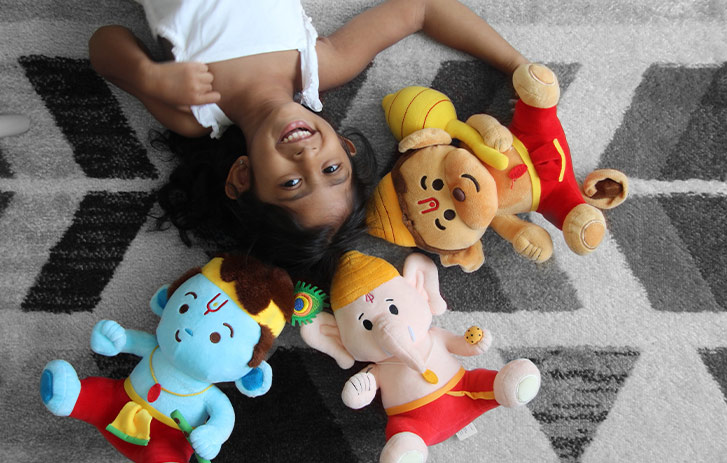
Small businesses benefit from inclusivity
Discover how four businesses focused on diversity, equity, and inclusion to serve the underserved. These FedEx small business grant winners flourished
Read article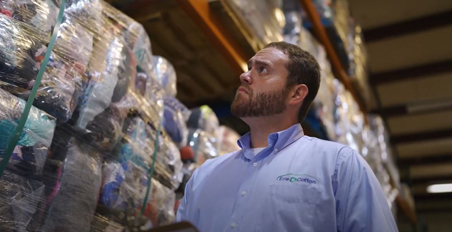
Erie Cotton's Sustainable Recycling Efforts
Erie Cotton is transforming unwanted textiles into wiping cloths. Learn about their innovative recycling and community impact.
Read Article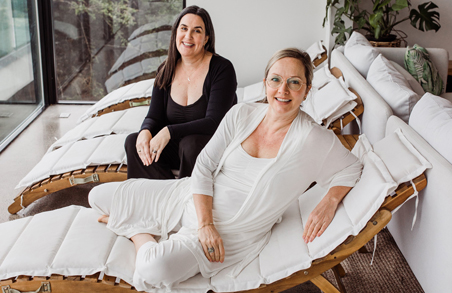
YALA's Sustainable Comfort Revolution
YALA delivers sustainable bamboo bedding and loungewear. Learn about their transition to direct-to-consumer sales and growth with reliable shipping.
Read Article